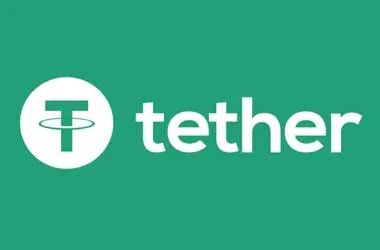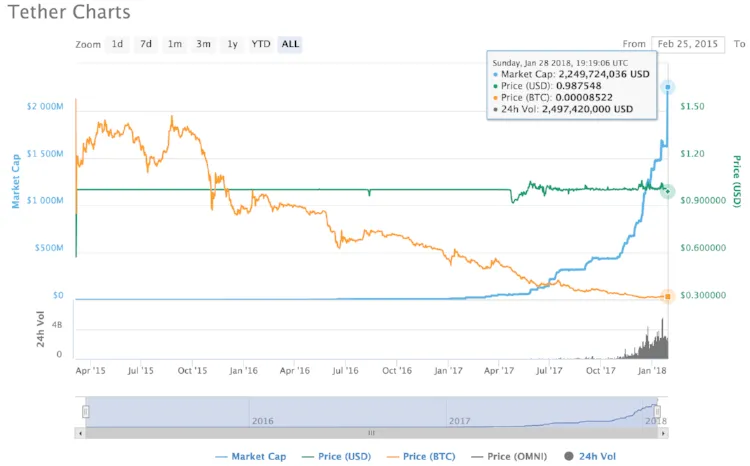
Steemit! I've mentioned before that I'm part of a crypto enthusiast group called Game Theory Group, created to bring together blockchain evangelists and enthusiasts from across the globe. We are based in Boston, New York City and Hong Kong. One of the top offerings of Game Theory Group is the Blockchain Brief newsletter, where I'm an editor. Here's the latest post about the Tether fiasco.
Are you an investor in cryptocurrency?
If you are, and you haven't heard of Tether ($USDT) then I highly urge you to sit up and take notice. Things are about to get a little crazy in crypto-land, to the tune of up to $2 billion dollars of assets turning into vapor. This would dwarf last weeks $500M+ hack of Japanese cryptocurrency exchange Coincheck.
Tether is a cryptographic token owned by the Tether Corporation
They haven't fully disclosed this, but it seems likely that the corporation is actually operated by the same folks behind the popular exchange Bitfinex. Tether was deployed as a "StableCoin" so that traders wanting to hold their money in a stable asset (but not USD) could easily do so within exchanges. $1 Tether ($USDT) is supposed to always be equal to $1 USD. In order to achieve this valuation, every amount Tether releases in digital currency should be backed by exactly equivalent real USD in their accounts. Reportedly, most exchanges literally hard-code the $1 USDT to $1 USD exchange rate on their order books, instead of letting the value float based on supply and demand.
By trading into an asset with low volatility like Tether, one could ride out a bear market, hold dry powder for an ICO, take a vacation from crypto-investing or any number of reasons one would want to be temporarily "out" of a market position.
Seems pretty stable, right? (green line is dollar price)

And, sure, it is. Remember, every $USDT is mimicking a USD held in reserve, as investors who want to withdraw a "StableCoin" into USD should be able to do so, right? The money has to be there.
Logic follows that if the market cap of Tether is $2.2 billion, as seen above, then somewhere the Tether Corporation is holding that much money in USD.
LOL, yeah right.
To create new $USDT at the rate we're seeing, Tether would need to be receiving tens of millions of dollars of institutional funding every single week, sometimes every day. Wallets with an enormous amount of Tether are being discovered on a near-weekly basis -- literally created out of thin air.
Why would that many sophisticated investors invest so much into an off-shore, previously hacked, dubiously operated company? No major institutional investors I could find have announced any partnership with Tether. In addition to that major question mark, Tether has currently turned off most forms of redeeming USDT into USD directly into a bank account. You can, of course, easily sell your Tether to someone else on a exchange -- swapping Tether between traders but never redeeming it directly from the Tether bank account.
Over $2B of Tether capital, printed at opportune times, can do quite a bit to prop up the price of Bitcoin. And Bitcoin price correlates with AltCoin price. To some degree, Tether is propping up a small but significant piece of the entire cryptocurrency market.
If Tether were any other currency, like Monero ($XMR) for example, then this wouldn't be such an issue.
People believe in the value of $XMR because they believe in the teams, the product, the developer community, and the network effect. Tether has a completely different psychology; Tether is "stable" and a safe haven on an exchange. If it continues to print Tethers at will and if the general public believes there are assets to the tune of $1 for $1, it could potentially never collapse even if the assets in the Tether vault don't exist.
But the crypto market is moving beyond the general public, and crypto investors are becoming more sophisticated. These investors want to ensure that if they store their assets in Tether, there's something to back it up. As the market cap of Tether skyrocketed in the final months of 2017 calls for an audit into their balance sheet began to mount.
Demands for Tether to hire a third party auditor heated up in November of 2017
After enormous pressure, they caved and hired Friedman LLP to conduct a full audit and prove they had the assets they said they had. After months of promising to release an audit and silence, CoinDesk reports on January 27th that Friedman and Tether have "dissolved" their relationship. Here, I believe, is where the market psychology begins to unravel.
If (when) Tether fails to provide a concrete and believable reason for this relationship with an auditor to unravel so spectacularly and unexpectedly, consumers could lose confidence in the entire thing. A quick look at the Tether subreddit does little to inspire confidence. If exchanges were to stop the BTC/USDT trading pair... over two billions dollars worth of assets might become illiquid, with regular traders holding much of that amount.
I don't know when this will happen, and I can't say with absolute certainty that Tether doesn't have the billions in assets they claim they do. All I can do is raise a yellow flag for those reading this newsletter.
Sign up for the Blockchain Brief newsletter right here!